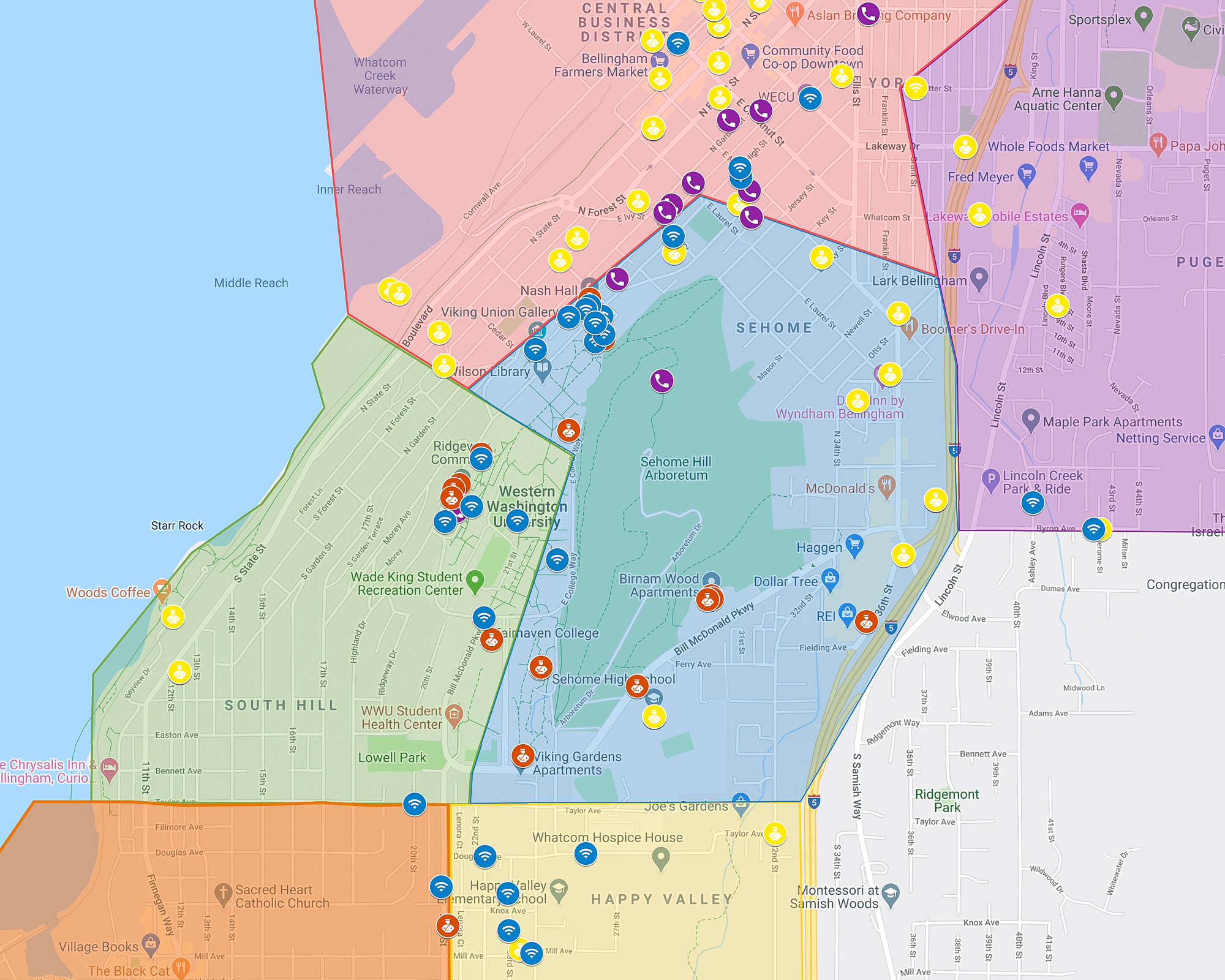Content Warning: This article references reports of sexual assault.
Map detailing survey data and Bellingham and University Police of reports of sexual assault. Image courtesy of the human services mapping group.
By Stella Harvey
In Human Service Professionals and Community Systems, a human services class, a group of students is working to address sexual assault at Western through a participatory research project.
Professor Brett Coleman, who teaches the course, said he re-organized the course to be more project-oriented in winter 2018 after hearing that students wanted to address issues impacting their community.
“The idea was if you want to teach people about systems change, let’s try to change a real system,” Coleman said.
The first group of students who worked on the project decided to focus on how Western handles sexual assault, Coleman said. From there, the class began brainstorming questions and doing research on the multi-faceted issue. Based on their finding, the students created an action plan and outlined how other students could address these issues through multiple quarters. Since then, the project has been passed from class to class for six quarters.
Michelle Christensen, a fourth-year human services student who is currently working on the project, said the class breaks into four groups, each focusing on a specific aspect of the problem. There is a group that works on mapping anonymously reported cases of sexual assault, a group that looks at Western’s housing system, a group that works to educate allies and a group that is working on adding a sexual assault disclaimer to syllabi across campus.
At the end of each quarter, each group writes a report summarizing what they worked on, and how they suggest the next group proceeds, Coleman said.
Christensen, who is a part of the mapping group, said that participatory research projects seek to engage and mobilize community members and stakeholders to address a problem in the community. Together, these groups work toward solutions, while centering people who are most affected by the issue.
“[Participatory research projects] really validate and value community knowledge while integrating and collaborating with more scholarly material,” Christensen said.
Grace Boyer, another fourth-year human services student in the mapping group, said at its core, the project works towards decreasing sexual assault on campus and making the process of reporting an assault better for survivors. In the mapping project, they work towards this goal by documenting cases of sexual assault through an anonymous survey.
The survey data is posted on the group’s WWU Sexual Assault map. The map shows Bellingham and University Police reports of sexual assault obtained through a public records request, as well as the reports made to the anonymous survey.
Before taking the survey, the Google form asks participants to read through a consent form that explains how the project will use data from the survey, and states that participation is completely voluntary. According to the form, many of Western’s policies and regulations do not effectively protect the survivors, and the survey gives people the opportunity to anonymously document when and where their assault took place.
Boyer said the survey is advertised through posters with QR codes around campus, including women’s bathrooms and other public spaces. Christensen said the group is also hoping to have individual departments send the survey out to students.
Gloria Guizar, a fourth-year student in the syllabi group, said in an email that her group is currently re-writing the disclaimer, which they hope will eventually appear in class syllabi across campus. The disclaimer outlines the section of Western’s Student Conduct Code that prohibits sexual misconduct and harassment. Guizar said her group is editing the disclaimer to be more empowering and to work as a resource.
In an email, Jack Forman, a fourth-year student in the ally education group, said this quarter he and his group members worked on raising awareness about sexual assault at Western among male-identified students and faculty through creating an Instagram page and putting up posters in the men’s restrooms. Forman said that all of the group’s posters are usually taken down within a day.
The housing group is trying to make the community standards that address sexual assault and harassment in residence halls more accessible to students, according to an email from Fourth-year Student Amanda Thomas. She said the group worked closely with Vicki Vanderwerf, the associate director of residence life, throughout the quarter to find the best way to distribute information to students.
In addition to spreading the word about the map and collecting accounts with the survey, the mapping group said they are also working with Prevention and Wellness Services [PWS] and Consultation and Sexual Assault Support Services [CASAS], and advocating for these organizations to receive more funding. She said the mapping group also wants to work with students to make this a campus-wide project.
“While we’re looking at our long-term, short-term and medium goals, what does it look like for students [to get involved] and what does that look like?” Christensen said.
Coleman said he wants the project to continue as long as he teaches this class, which will be for at least another quarter. He said he would like to see more community engagement and collaboration so that the project can continue, even if it is not being taught in a class.
“As people, we tend to just defer to the authorities [and say] ‘they’ll fix it. It’s their responsibility.’ But that doesn’t work,” Coleman said. “It’s a much deeper problem than any particular office can handle, so it really requires all hands on deck.”
To learn more or get involved with the project, email hsp404wwusa@gmail.com.

